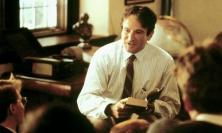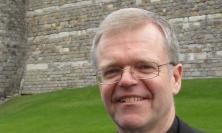‘The task of Catholic educators today ... is to offer to learners the possibility of an encounter with Jesus Christ.’ At the beginning of a new academic year, Nicholas King SJ suggests how Catholic teachers can and do respond to the challenges that are contained in this task. How can educators create a space in which today’s young people can find the Jesus they are longing to meet?
There is an unfortunate and growing temptation on all sides of the field of education to turn ‘learners’ into ‘customers’. A consequence of this is to see the task of Christian educators as just another job, whereas in fact it is an awesome responsibility, one which all of us involved in education would do well to think about.
The following words from the Rule of St Benedict, that treasury of succinct and hard-won wisdom, may be an apt place at which to begin our reflections:
It should be very clear to superiors that those who undertake the guidance of souls must in the end prepare themselves to give an account of that guidance. However many the souls for whom they are responsible all superiors may be sure that they will be called to account before the Lord for each one of them and after that for their own souls as well. Frequent reverent reflection on that future reckoning before the Good Shepherd who has committed his sheep to them will, through their concern for others, inspire them to greater care of their own souls. By encouraging through their faithful ministry better standards for those in their care, they will develop higher ideals in their own lives as well.[1]
The task of Catholic educators today, those who have been called to this ‘guidance of souls’, is different to that of their predecessors. We live now in a world where the Spirit is inviting us to a much greater openness in our religious education. The challenge today is not to offer the present set of learners that – in many ways very attractive – set of coherent and confidence-inducing beliefs that their direct ancestors received, but something different: it is to offer to them the possibility of an encounter with Jesus Christ.
Now it needs to be said right away that you cannot possibly make this encounter happen, all you can do is create the conditions of possibility; and a Catholic school is a very good place to do it, for the question about Jesus, and the ancient faith of Catholicism that frames that question, is part of the wallpaper. But today’s learners are very different to those of the 1950s and 1960s. I hazard the guess that most children in Catholic schools do not go to church on Sunday of their own accord, that their parents are not always practising in that narrow sense of being at Mass on Sunday; but that today’s students are nevertheless remarkably more open to religious faith, to Christianity, and even to the Catholic expression of that faith than such people were even ten years ago. That is my impression from the youngsters with whom I am dealing. I hazard the further guess that modern learners know almost nothing of this Catholic faith, even though they are quite open to it.
What further guesses can I make? I suspect that they no longer live in that neat world of sins that are ‘venial’ and ‘mortal’ in which many of us grew up. We also knew exactly what counted as Friday abstinence and Ash Wednesday fasting, and by what point in Sunday Mass you had to arrive, and when you could leave, if you were to fulfil the obligation. Today’s students, and their recent predecessors, live in a very different world: they will tend uncritically to sleep with their girlfriends or boyfriends, not to feel obliged to go to Mass every single Sunday, nor, in either of the above cases, to make their confession before receiving communion. As a general rule, they will receive communion whenever they attend Mass, without asking the questions that we should have asked about whether they are in a state of grace. And they will, by and large, not understand the reservations about same-sex marriage. They will even be a bit puzzled that the Church – which on the whole they rather like – concentrates so much, and so negatively, on what an eminent lawyer of my acquaintance describes as the ‘more pelvic sins’.
The function of Catholic educators is, as I say, to present these youngsters – who are not, it has to be said, bad people! – with the possibility of encountering Jesus Christ.
So what is the best way to go about this? I wish to suggest three things, and I suspect that many Catholic teachers are already doing all of them.
The first is: good liturgy. That is to say you have to find a ritual and solemn expression for the truths by which this community lives. This liturgy is to be judged not by its success in obeying all the rubrics laid down for the reverent conduct of a service, but by making possible the hearing of God’s Word and, again, the encounter with Jesus Christ.
The second is necessarily connected with the first. You have to ‘walk the talk’. The task of a Catholic educator is to preach the gospel, and if in the everyday business of educating you are forever making it clear that children and teachers and parents are all an unimportant inconvenience, whom you nevertheless have to pacify if you are to maximise the turnover of your business, then you will be telling them all that the gospel is not true. If your academic community condones racism, or treats the domestic staff as inferior, or women as unimportant, or permits bullying at any level, then it is denying the radical truth of Jesus’s dangerously subversive message of unconditional love.
The third is that you must expose them to the Word of God, especially the gospels, because they tell the story, and it is a good instinct in Christianity and Judaism to express our deepest truths in narrative form. Never, however, neglect the Old Testament, as Christians have dangerously tended to do since at least the days of Marcion in the 2nd Century AD.
Anyone working in Catholic education will of course know that none of these things is easy. For example, you might say, ‘liturgy needs good priests, and our priest is a stick-in-the-mud, and way past his sell-by date’. Secondly, you point out, ‘you have no idea what our teenagers like on a Friday afternoon – not even their mothers can love them’. Thirdly, you argue, surely modern biblical studies have proved that the gospels are a pack of lies and you cannot go exposing the young to the disedifying tales of the Old Testament? All the Bible does is tell us that the world was created in six days, when palaeontology tells us quite a different story.
All of these are common objections, and valid – to a point. Good liturgy depends on the creative imagination of the entire community, expressing what it is and where its heart lies. It does not depend on priests, and perhaps if you find yourselves in difficult circumstances, you might consider conducting a prayerful service of the Word of God.
And what about the unlovability of teachers, children and parents? Well, we know what it can be like when the term has dragged on for too long and tempers are frayed, but there is a truth at the heart of Catholic education: every human being – including your least co-operative colleague, that appalling adolescent who has just carved his initials on your office-door, and the parent who can only ever speak in complaint mode – is created in God’s image and likeness.
As for the truth of the Bible: that notion that it is all about a six-day creation of the world is a sure sign of a lazy reader who started to read the Bible and could get no further than chapter 1 of Genesis and failed to realise that, far from attempting a scientific treatise, it is in fact a hymn of praise to the generosity of the Creator God. The intense academic investigations into biblical materials over the last 200 years or so have left us with a much better understanding of the text, but left God’s Word to be just as reliable as it ever was, and you are safe to read it yourselves and to expose young people to its challenge.
A practical suggestion might be this: read the New Testament with your students, perhaps starting with the Gospel of Mark (only because it is the shortest and in some ways the liveliest), and invite them to sit with it, or act out the story, or draw pictures, or model clay, or follow the example of Popes Benedict XVI and Francis and tweet about it. Above all, invite them to encounter the personality that leaps from the pages of the New Testament, that strange Galilean Rabbi who so annoyed the religious establishment that they persuaded the Romans to kill him. And there is the central fact that God (here is the thing to which teachers and learners must hold firm) raised that Rabbi from the dead. That is the heart of our Catholicism, that and the astonishing fact that in Jesus, ‘the word became flesh and pitched his tent among us’.
It may seem at times as if it is the ‘pelvic’ matters that are at the heart of our faith, given the amount of attention devoted to them. Those particular issues are important at this stage of the development of Christianity, not least because our discourse about them does not always seem to make sense to our contemporaries. But Catholicism is not the series of ‘no’s it is so often made out to be; rather it is an affirmation of the goodness of God and of God’s creation.
Catholicism, you see, is the 2000-year-old tradition of attempting to live out the gospel. At different times in our history, different problems have surfaced in the course of that living out. In Paul’s day, it was what to do about incest and personality cults in a community; in another era, it was how to talk sense about Jesus being human; at another time, it was the question of whether Christians could fight in defence of the truth or of their country; at another, whether you could charge interest on loans; at yet another, it was whether the clergy should wear special clothes. Even in our lifetimes, the Church has changed radically on the question of burying people who have taken their own lives. There are always issues to be dealt with, and they may be urgent at any one time in history – but they are not the heart of the matter. Catholicism runs broad and deep; it is not sectarian (as it would be if it were all about just one or two issues), nor is it instinctively condemnatory, as it too often presents itself. That was how Jesus’s opponents presented themselves in their response to the dreadful people with whom Jesus associated. The grim fact is that Jesus had the most terrible friends and was (and remains) a thorough-going embarrassment to good religious people.
This Jesus is the one to whom young learners are aching to open up, whether they realise it or not. Jesus talks ‘human’ in an age where some in the Church seem to talk a language all of their own, which no one outside the bubble can comprehend. The Catholicism into which I grew up, and to which I am enormously grateful, seemed to radiate a certainty about absolutely everything. That certainty is no longer pastorally helpful, and we need to go back to the only certainties that matter: that there is a God and that God loves the world, and that God sent Jesus, whom we killed and whom God raised from the dead, so that after all love is victorious.
So I want to suggest that the faithfulness of Catholic educators may consist less in giving learners secure answers than in encouraging them to ask the right questions. That seems to me to be in keeping with current educational theory, and such an approach seems to speak to our times, which so desperately need the truth that Catholicism offers.
Nicholas King SJ is a tutor in Biblical Studies at Campion Hall, University of Oxford.
This article is an edited version of a talk delivered at Downside School on 12 March 2013.
[1] Saint Benedict’s Rule – A New Translation for Today, Patrick Barry OSB, Ampleforth Abbey Press, 1997.






